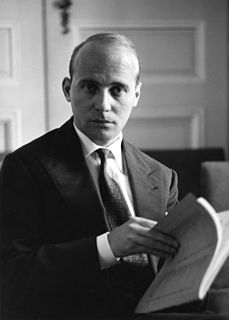The Berlin Philharmonic is a German orchestra based in Berlin. It is rated top among leading orchestras in the world, distinguished amongst peers for its virtuosity and compelling sound.

Hans Werner Henze was a German composer. His large oeuvre of works is extremely varied in style, having been influenced by serialism, atonality, Stravinsky, Italian music, Arabic music and jazz, as well as traditional schools of German composition. In particular, his stage works reflect "his consistent cultivation of music for the theatre throughout his life".
Peter Ruzicka is a German composer and conductor of classical music. He was director of the Hamburg State Opera, the Philharmonic Orchestra of Hamburg and the Salzburg Festival. Ruzicka was managing director and Intendant of the Salzburg Easter Festival and is professor at the Hochschule für Musik und Theater Hamburg. The list of his compositions includes numerous orchestral and chamber music works as well as the opera "Celan", about the poet Paul Celan, which was premiered in Dresden in 2001. His opera "Hölderlin" had its premiere at the Berlin State Opera in 2008. Ruzicka's third opera "Benjamin", about the philosopher Walter Benjamin, was written in 2015/16 for the Hamburg State Opera and premiered in 2018.
Hans Werner Henze's Symphony No. 1 was premiered in Darmstadt in 1947. The premiere was hit by Henze’s accustomed bad luck. The orchestral parts, handwritten by the composer himself, had become illegible during photocopying in Schott’s offices and despite the young composer’s best efforts to ink in the parts throughout the night, only the slow movement was performed. The whole symphony was eventually premiered a year later, although Henze himself conducted the work only after comprehensive revision.
This is the discography of Simon Rattle and other produced works by the English conductor.
The Piano Concerto No. 2 in G major, Sz. 95, BB 101 of Béla Bartók is a musical composition for piano and orchestra. The work which was composed between 1930 and 1931, is notorious for being one of the most difficult pieces in the repertoire.
The Hans von Bülow Medal is awarded by the Berlin Philharmonic Orchestra to outstanding musicians close to the orchestra. The medal is named after its first Chief Conductor, Hans von Bülow.

Ingo Metzmacher is a German conductor and artistic director of the festival KunstFestSpiele Herrenhausen in Hanover.

Hans Werner Henze composed the nine Sacred Concertos that comprise his Requiem over the course of three years from 1991 to 1993 on commissions from the London Sinfonietta, Suntory Corporation for the NHK Philharmonic, and Westdeutscher Rundfunk, Cologne. The first movement, Introitus: Requiem Aeternam was commissioned by the London Sinfonietta as part of a memorial concert for Artistic Director Michael Vyner who died on 20 October 1989. In addition to Henze, the London Sinfonietta also commissioned seven other prominent composers to write works in Vyner's memory to make up the program which was performed on the 6 May 1990.
Tristan is a six-movement orchestral work by the German composer Hans Werner Henze.
The Ninth Symphony of the German composer Hans Werner Henze was written in 1997.
The Eighth Symphony by the German composer Hans Werner Henze was composed in 1992–93.

The Dortmunder Philharmoniker are a German symphony orchestra based in Dortmund. The orchestra of the Theater Dortmund performs opera in the Opernhaus Dortmund and concert in the Konzerthaus Dortmund. The orchestra was founded in 1887 and has been shaped by conductors such as Wilhelm Schüchter, Marek Janowski, Moshe Atzmon and Jac van Steen.
Walter Piston's Serenata for Orchestra is an orchestral suite or miniature symphony written in 1956.
The Third Symphony by Alfred Schnittke was his fourth composition in the symphonic form, completed in 1981.
Fantasia for Strings is a composition by German composer Hans Werner Henze. It was finished in 1966, as part of the soundtrack for Volker Schlöndorff's film adaptation of Robert Musil's novel The Confusions of Young Törless. This composition has been published by Schott Music.

Piano Sonata No. 1 in A major is the first piano sonata by German composer Paul Hindemith. It was finished in 1936 and is subtitled Der Main after a poem by Friedrich Hölderlin.
Heliogabalus imperator, allegoria per musica is an orchestral work by the German composer Hans Werner Henze.
Symphony No. 2 by Hans Werner Henze was composed in 1949 and premiered on 1 December that year in Stuttgart by the South German Radio Symphony Orchestra conducted by Hans Müller-Kray. The symphony is dedicated to the conductor Hermann Scherchen.
Hans Werner Henze's Symphony No. 3 was written between 1949 and 1950. It was premiered at the Donaueschingen Festival on 7 October 1951 by the South German Radio Symphony Orchestra conducted by Hans Rosbaud.



